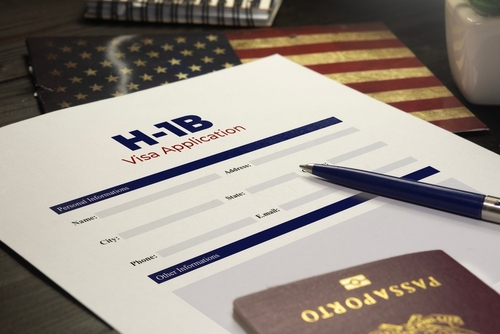Immigration Law
What’s in Trump’s proclamation imposing $100K fee for H-1B fee applications? Bypass is possible

President Donald Trump included a bypass opinion when he imposed a $100,000 fee on applications for the H-1B visa program for skilled foreign workers. (Photo from Shutterstock)
President Donald Trump included a bypass opinion when he imposed a $100,000 fee on applications for the H-1B visa program for skilled foreign workers.
In his Sept. 19 proclamation, Trump said the H-1B nonimmigrant visa program was created to bring temporary workers into the United States “to perform additive, high-skilled functions.” But the program “has been deliberately exploited to replace, rather than supplement, American workers with lower-paid, lower-skilled labor,” Trump said.
The details that follow explain when the program takes effect and how Kristi Noem, the secretary of the Department of Homeland Security, could create exceptions. According to the proclamation:
• The entry of nonimmigrants into the United States to perform services in the H-1B specialty program “is restricted,” except for those whose petitions “are accompanied or supplemented by a payment of $100,000.”
• The fee requirement applies “only to aliens who enter or attempt to enter the United States after the effective date of this proclamation,” which is Sept. 21, 2025.
• The fee requirement expires after one year. U.S. officials must submit to Trump whether an extension or renewal of the fee requirement is in the interest of the United States.
• The fee requirement doesn’t apply if the secretary of the Department of Homeland Security determines that H-1B hiring for a company or an industry “is in the national interest and does not pose a threat to the security or welfare of the United States.”
• The secretary of the Department of Labor should begin rulemaking to revise prevailing wage levels and to prioritize admission of high-skilled and high-paid workers. The prevailing wage is the mandatory minimum wage for H-1B workers, explains David J. Bier, director of immigration studies at the Cato Institute, in a summary of the new proclamation.
A White House spokesperson has said the fee applies only to new visas and not renewals, and it will apply to the next lottery cycle, according to the Washington Post. The lottery is used to choose visa recipients out of the pool of qualified applicants.
According to Law360, the $100,000 fee “is a significant jump for H-1Bs.” Currently, there is a $215 general filing fee along with other fees. There is a $2,805 charge for premium processing service.
In 2020, Trump issued a proclamation banning new H-1B workers for four sets of workers, but a federal judge preliminarily enjoined the action, Bier pointed out. U.S. District Judge Jeffrey S. White of the Northern District of California said in an October 2020 opinion Trump does not have “unbridled authority to set domestic policy regarding employment of nonimmigrant foreigners.”
Bier said there is no statutory basis for a fee that exceeds the cost of applications processing, but “there is some reason for concern that the courts would uphold this action” given “the vague authorities in immigration law.”
Doug Rand, a senior adviser to the former director of U.S. Citizenship and Immigration Services under former President Joe Biden, told the Washington Post that he expects that the $100,000 fee will “almost certainly” be reversed in a legal challenge.
Write a letter to the editor, share a story tip or update, or report an error.

